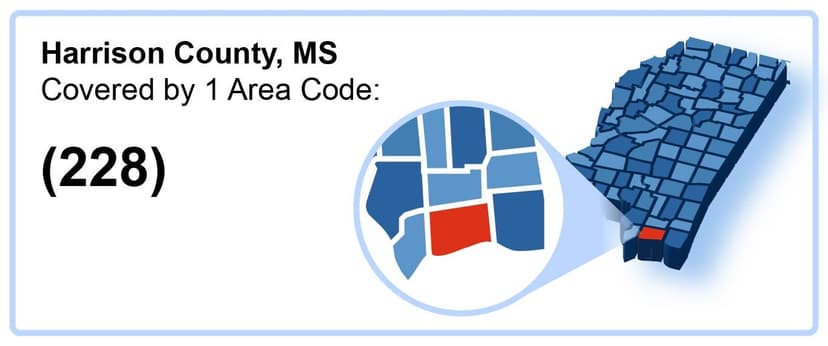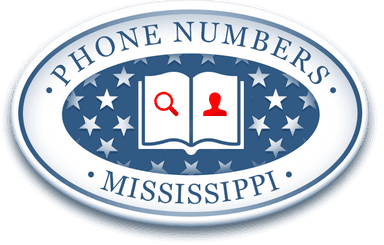What are Harrison County Area Codes?

The North American Numbering Plan (NANP) which was adopted in 1940, was established to consolidate all the telephone numbering plans for various telephone service providers in North America. The NANP divides the territories of members into numbering plan areas which are encoded with three-digit telephone numbers prefixes, called area codes. The North American Numbering Plan administrator is responsible for the distribution of Area Codes in North America.
There is currently only one area code serving Harrison County. It covers the Gulf Coast of Mississippi, including Harrison and Hancock.
Area Code 228
Area code 228 is the North American telephone area code for Harrison County and parts of other surrounding counties. Area code 228 was the second area code in Mississippi. It was created in 1997 in a split from area code 601. Area code 601 was the only area code serving the entire state at the time. Area code 228 covers all the cities in Harrison County, including Biloxi, Gulfport, Long Beach, Pass Christian, and Diberville.
Scammers may spoof their caller ID information to display either local or international area codes, depending on what they intend to achieve. Residents of Harrison County should not hesitate to use area code lookup services when in doubt.
What are the Best Cell Phone Plans in Harrison County?
A 2018 National Center of Health Statistics survey estimated that 66.5% of Mississippi adults exclusively used wireless telephone services, while 3.9% used landline as their only telephony service. 14.1% of Mississippi adults used wireless telephone services as their preferred telephone services. By contrast, only 4% of the adults used landline as their number one telephony service. 8.1% of Mississippi adults used landlines and wireless telephone services.
The difference is more evident among minors, as 80.9% exclusively used wireless telephone services. By contrast, only 0.6% of Mississippi minors exclusively used landlines as their telephony services. 11.3% of the minors used wireless telephone services as their first choice, while 1% used landlines as their number one telephony service. These figures infer that residents of Harrison County used cell phones more than landlines.
The primary phone carriers- AT&T, T-Mobile, Verizon, and Sprint, provide decent coverage in Harrison County. However, several Mobile Virtual Network Operators (MVNOs) serve as alternative coverage providers in the county. Verizon has the best coverage in Harrison County with a relative rate of 98% compared to other providers. AT&T comes second with 86% coverage. T-Mobile follows closely with about 84% coverage, while Sprint offers the least coverage with just 64% coverage. These figures show that service quality in the county is not bad, however, it can be improved. Service quality tends to drop in areas with a dense population.
Residents of Mississippi may choose from several wireless telephone services available in the state. One of such services is the Voice over Internet Protocol (VoIP). VoIP allows users to deliver voice communications and multimedia sessions over the internet. Many companies presently offer VoIP services to residents of Harrison County. Residents may contact VoIP providers to subscribe to either business plans or personal plans, or both. The State of Mississippi performs no regulatory function on VoIP services in the state. Residents may contact the Federal Communication Commission to report VoIP concerns.
What are Harrison County Phone Scams?
These are scams targeted at residents of Harrison County, using telephone calls, text messages, emails, and online advertisements. Phone scams are aimed at stealing money or personal information from unsuspecting victims. Reverse phone number lookup services can help identify potential scam calls.
What are Harrison County Law Enforcement Impersonation Scams?
Residents of Harrison County receive calls from scammers who pose as sheriff deputies. The caller tells you that a Failure to Appear Warrant or a Contempt of Court Warrant has been issued through the County Sheriff's Department. Scammers ask victims to drive to the Harrison County Jail Kiosk and pay $875 or go to jail for the warrant. Scammers may spoof their caller ID information to display the Sheriff's Department’s caller ID information. However, most of these phone numbers are fake, the sheriff department maintains that these numbers are forwarded using fake phone apps. Phone number searches help identify some of these phone numbers.
No law enforcement agency or court system addresses outstanding fines or warrants on the phone. This is done by personal service or hand-delivered subpoena. If you have received this type of phone call, contact your local enforcement using the office phone number.
What are Harrison County Financial Institutions Scams?
There are many variations of financial institution scams. Residents of Harrison County have often reported calls from scammers parading themselves as employees of their financial institutions. Scammers tell the victims that their accounts have been blocked. To resolve the issue, scammers request confidential information from the victims. The scammers may request the victims' card numbers, CVV codes, PINs, or expiry dates. Note that financial institutions do not need your card PIN for anything. Scammers will often try to hide their identities, but phone number searches can help you identify where phone calls originate. Residents may run reverse phone lookups on phone numbers that look suspicious.
What are Harrison County Phishing Scams?
In phishing scams, hackers contact unsuspecting citizens and try to convince them to open new emails or click on some links. By doing so, victims unknowingly give scammers access to their personal information. Scammers may use the information to steal directly from the victims or to impersonate the victims. This infers that phishing scams are used to facilitate identity thefts. Scammers also use their victims’ information to apply for unemployment benefits or Covid-19 relief funds. If you receive a call from someone asking you to create a new email, hang up immediately, as it is most likely a scam call. Reverse phone number searches may help identify scam callers. Identity theft and phishing scams may be reported to the Federal Trade Commission (FTC).
What are Harrison County Charity Scams?
In these scams, victims receive calls from scammers impersonating charity organizations. The scammer asks for donations towards a Covid-19 relief plan. Scammers ask victims to make payments in cash only. This is to make sure that victims do not seek a refund once the money is paid. Charity scams are common during or immediately after the occurrence of natural disasters. Scammers use bad events to trick unsuspecting citizens into giving up their money. Residents should not hesitate to verify charities or nonprofit organizations asking for donations. A reverse phone number search may be of assistance in identifying who called. When in doubt, contact the National Center for Disaster Fraud to find out more about the organization.
What are Harrison County Covid-19 Scams?
In Covid-19 scams, victims receive phone calls from scammers who pose as health workers. These scammers inform victims of new test kits and vaccines and claim that the products are effective. The products often include fake Covid-19 cures, test kits, immunity pills, and protective equipment. Residents should be vigilant as scammers are using the pandemic to sell bogus products and services. Although scammers may spoof their caller ID information, residents should not hesitate to conduct reverse phone number lookups regardless, if they suspect fraud. Contact your local enforcement if you suspect a Covid-19 scam activity.
What are Robocalls and Spam Calls?
Robocalls are phone calls that deliver pre-recorded messages in whole or in part. They use computerized auto-dialers to select the audiences and deliver prerecorded messages to them. Robocalls are used by telemarketing businesses, non-profit organizations, and public institutions. In the State of Mississippi, legitimate telemarketers use robocalls to sell their products or services to residents. However, robocalls have become vital tools in the hands of scammers. Due to the high level of anonymity robocallers enjoy, scammers use robocalls to hide their true identities, intending to retrieve personal information from unsuspecting citizens. Reverse phone lookup services can be used to confirm if an incoming call is a robocall or not.
Here are actions you can take if you receive a robocall:
- Hang up immediately you realize that the call you picked is a robocall.
- Do not press any number if prompted by the system. Any type of interaction with the call increases the number of calls you may receive in the future.
- Report illegal robocalls to the Mississippi Public Service Commission. You may also file a complaint to the FTC online or call 1-888-382-1222.
- Use online services that offer phone number searches free of charge to identify robocalls.
- Ask your phone provider to block the number associated with the robocall.
- Include your phone number in the National Do Not Call Registry.
You may also avoid receiving calls from unknown numbers. It saves you from wasting time listening to pre-recorded messages. A robocall is often used to detect whether the recipient is a live person or whether a phone number is still active and target them with scams. A robocall you did not permit is likely a scam call. A telemarketer needs your written permission to call you with a robocall. Phone number lookup tools help residents identify potential phone scams.
How to Spot and Report Harrison County Phone Scams?
Phone scams are causing lots of havoc in Harrison County. Fraudsters are always evolving new means and methods to steal from residents. The best way to avoid getting scammed is vigilance. However, providing updates on new scam tricks may prevent potential scams. Reverse phone number lookup services help identify potential phone scams. Indications that a phone call is a scam include:
- The use of aggressive tactics, such as threats of arrests, garnishment, suspension, and withdrawal of license to coerce you into releasing personal information or money.
- Payment requests that must be made through gift cards, bitcoins, reloadable prepaid debit cards, etc.
- Opportunities or offers that require you to pay upfront.
- Solicitation of funds from the caller who poses as a representative of a government agency.
Public institutions in Mississippi and Harrison County are committed to assisting residents and victims of phone scams. They include:
Mississippi Office of the State Auditor- The office provides residents with updates on phone scams in the state. The auditor tells residents where and how they can report different types of phone scams in the state. You may contact the Office of the State Auditor by phone using 601-576-2800.
Mississippi Office of the Attorney General- The office protects residents of Mississippi from unfair and deceptive business practices. It also protects consumer privacy and advocates against illegal robocalls. Residents may file consumer complaints with the office. Call 601.359.3680 for more information. The Office may assist you with reverse phone number lookup.
Mississippi Public Service Commission - Victims of illegitimate robocalls and other scams can report these cases to the Commission by calling 601-961-5434. It also maintains a Do Not Call Registry for residents of the state. Residents may register their phone numbers on the list to reduce unsolicited calls.
Harrison County Sheriff's Office - The protects residents of the county from scammers. It provides updates on the prevalent phone scams in the county. Call 911 for emergency calls and 228-865-7060 for non-emergency dispatch calls.
Better Business Bureau - The Better Business Bureau maintains lists of business entities that are registered in Harrison County. The BBB also provides information about scams prevalent in Harrison County.
Federal Trade Commission - The FTC protects consumers from deceptive and fraudulent practices. The FTC initiated the National Do Not Call Registry as part of its efforts to eliminate unwanted calls.
